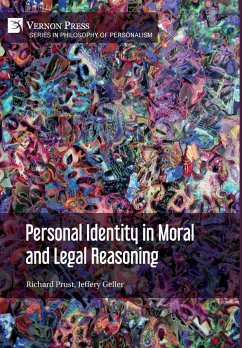
Personal Identity in Moral and Legal Reasoning
Versandkostenfrei!
Versandfertig in über 4 Wochen
48,99 €
inkl. MwSt.
Weitere Ausgaben:

PAYBACK Punkte
24 °P sammeln!
Many questions about moral and legal judgments hinge on how we understand the identity of the agents. The intractability of many of these questions stems, this book argues, from ignoring how we actually connect actions with agents. When making everyday judgments about the morality or legality of actions, we do not use Aristotelian logic but what is termed "character logic". The difference is crucial because implicit in character logic is an understanding of personal identity that is both coherent and intuitively familiar. A person, as we conceptualize him in moral and legal contexts, is a char...
Many questions about moral and legal judgments hinge on how we understand the identity of the agents. The intractability of many of these questions stems, this book argues, from ignoring how we actually connect actions with agents. When making everyday judgments about the morality or legality of actions, we do not use Aristotelian logic but what is termed "character logic". The difference is crucial because implicit in character logic is an understanding of personal identity that is both coherent and intuitively familiar. A person, as we conceptualize him in moral and legal contexts, is a character of resolve. By unpacking what it means to be a character of resolve, this book reveals what underwrites our most fundamental beliefs about a person’s rights and responsibilities. It also provides a new and useful perspective on a variety of issues about rights and responsibilities that perennially occupy philosophers. This book discusses the following: • How we can make better sense of "human rights" if we think of them as "personal rights". • How the right to be civilly disobedient, in contrast with ordinary law-breaking, can be justified as a personal right. • What basis we have for holding that someone’s responsibility is diminished. • How it makes sense to hold someone responsible for acting irresponsibly. • How it makes sense to distinguish a juvenile offender from someone who should be tried in criminal court. • What kind of correction we should expect from our correctional institutions and how we should design them to achieve that. By making explicit the axioms of character logic and exploring their origins and justification, the book provides a conceptually powerful tool for interpreting the protocols of a person-respecting society.


